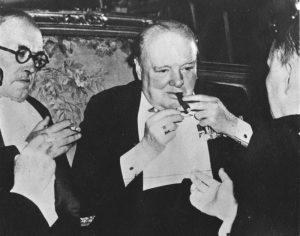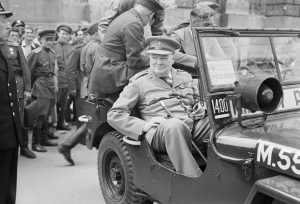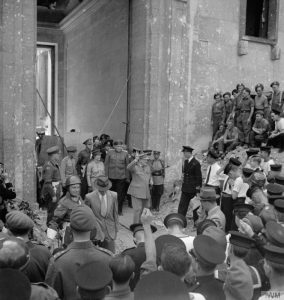
Finest Hour 162
Munich in Retrospect: Was It Better to Fight in 1938?

Winston Churchill, Parliament Square, London © Sue Lowry & Magellan PR
February 13, 2015
Finest Hour 162, Spring 2014
Page 12
By Richard M. Langworth
Here we stir the embers of the past and light the beacons of the future. Old flags are raised anew; the passions of vanished generations awake; beneath the shell-torn soil of the twentieth century the bones of long dead warriors and victims are exposed. And the wail of lost causes sounds in the wind.”
—Churchill, The Aftermath, 1929
The 75th anniversary of Munich last autumn was marked by analogies. During the uproar over Syria’s chemical weapons, the American Secretary of State declared, “This is our Munich moment.” Later his opponents called easing sanctions on Iran “another Munich.” Both comparisons were inapt, except as examples of that lack of resolve which is part of human nature. Germany in 1938 was at once a greater threat, and less suicidal, than today’s villains. Iranian mullahs, by contrast, declare martydrom a path to glory. At least for their co-religionists. And now we have Ukraine, on which more analogies will be drawn about when and when not to stand firm.

2024 International Churchill Conference
That the Nazis were not suicidal is I think significant. In the autumn of 1938, high-ranking Germans had a credible plan to depose Hitler if the Anglo-French stood firm at Munich. A defeat for Hitler was not inconceivable. The French army was partly mobilized, the Royal Navy fully mobilized. Munich’s by-products were a demoralized France and an unassailable Hitler.
Churchill was certain that 1938 was the time to resist, and said so in his war memoirs. Yet we are regularly told that the Munich agreement was necessary and wise, that it gave Britain more time to arm. We are less rarely reminded that it also gave Germany more time to arm— and to neutralize a potential enemy in the Soviet Union, while reaping a military bonanza in Czechoslovakia.
Obviously, goes the refrain, Britain and France could not have defended landlocked Czechoslovakia. There was more to its defense than that, as Churchill wrote: “It surely did not take much thought…that the British Navy and the French Army could not be deployed on the Bohemian mountain front.”1
If fighting or resisting Adolf Hitler in 1938 was so ludicrous a concept, what was there about fighting him in 1939-40 that made it so preferable? Was it the eradication of Poland in three weeks, the Low Countries in sixteen days, France in six weeks?
Churchill, who had only the scholarship of 1948— testimony at Nuremberg, recovered Nazi documents, private contacts—argued that Munich was the best opportunity to stop Hitler. Was he wrong? How has his theory stood the test of time and modern scholarship?
The answer is: pretty well—as this issue demonstrates. Reading it may convince you that Prime Minister Chamberlain “missed the bus” at Munich. Remember, though, that contrary arguments exist, and qualified counter-arguments are always welcome in these pages.
Williamson Murray begins by comparing the balance of military forces and political circumstances between 1938 and 1939. Some of his revelations are new and startling; some are common sense. Next, Michael McMenamin takes up the plot against Hitler—which, he says, was stopped cold by Hitler’s Munich triumph. We also provide Churchill’s 1948 arguments.
This is no attempt to pillory Neville Chamberlain, an easy target for generations of second-guessers. Without his rearmament programs and support of his successor, Churchill could not have successfully fought the Battle of Britain. Chamberlain was wrong about Hitler, but he had as Churchill said the “benevolent instincts of the human heart…even at great peril, and certainly to the utter disdain of popularity or clamour,” striving “to the utmost of his capacity and authority, which were powerful, to save the world from the awful, devastating struggle.”2
An aspect of Munich touched on by Professor Murray was voiced during the planning of this issue by one of Finest Hour’s editors: “Whatever the relative strengths between UK/France and Nazi Germany in 1938, World War I was so recent in the national memories that public opinion (and Parliament) would never have been in favour of any pre-emptive ultimatum or strike at Hitler. It took two more Nazi outrages—the absorption of Czechoslovakia and the attack on Poland—to persuade everyone that enough was enough.”
This insightful observation has been made before. But again, we rarely hear the counterpoint: that the Germans too had had a bellyful of war and its disastrous aftermath. Rapturous crowds, believing he brought peace, greeted Chamberlain in Bad Godesberg on September 22nd. Berliners watching as Hitler reviewed a motorized column five days later were sparse and sullen, in the words of an eye-witness, William Shirer: “the most striking demonstration against war I’ve ever seen.” Hitler turned away in disgust, remarking to Goebbels, “I can’t lead a war with such people.”3
The British popular will certainly registered with Chamberlain, and his predecessor. It was Prime Minister Stanley Baldwin who in 1936 had restrained the French after Hitler had occupied the Rhineland. When French Foreign Minister Pierre Flandin appealed for Britain to mobilize, Baldwin replied that he knew the British people, and they wanted peace. Flandin was convinced that France would not act without Britain, and that Britain would do nothing.4
Churchill snorted at Baldwin’s interpretation of his duty. The responsibility of a leader is to lead, he said, and the leader’s primary concern is the safety of the nation—whatever the consequences:
I would endure with patience the roar of exultation that would go up when I was proved wrong, because it would lift a load off my heart and off the hearts of many Members. What does it matter who gets exposed or discomfited? If the country is safe, who cares for individual politicians, in or out of office?5
Churchill made that ringing declaration in 1936. Now it was 1938. Hitler had absorbed the Rhineland and Austria, and was after Czechoslovakia. Self-evidently, the British were by now less pacifist; many were outraged. Lord Halifax, so often portrayed as an abject appeaser, led a “cabinet revolt,” saying Hitler could never be trusted, telegraphing Chamberlain: “Great mass of public opinion seems to be hardening in sense of feeling that we have gone to the limit of concession.”6 Churchill’s reply to the notion that Britons would never fight was given in an interview three months after Munich:
I am convinced that with adequate leadership, democracy can be a more efficient form of government than Fascism. In this country at any rate the people can readily be convinced that it is necessary to make sacrifices, and they will willingly undertake them if the situation is put clearly and fairly before them. No one can doubt that it was within the power of the National Government at any time within the last seven years to rearm the country at any pace required without resistance from the mass of the people. The difficulty was that the leaders failed to appreciate the need and to warn the people, or were afraid to do their duty, not that the democratic system formed an impediment.7
There are many incalculables. We cannot know the military outcome, the result of a coup, or the British public’s attitude if the English and French resisted. In 1939, Britons largely supported declaring war over Poland —far less defensible than Czechoslovakia had been.8 Properly alerted to the realities, would the people have backed resistance in 1938? Churchill thought so:
The pace is set by the potential aggressor, and, failing collective action by the rest of the world to resist him, the alternatives are an arms race or surrender. War is very terrible, but stirs a proud people. There have been periods in our history when we have given way for a long time, but a new and formidable mood arises.9
Churchill’s interviewer queried: “A bellicose mood?” No, said Churchill: “A mood of ‘Thus far, and no farther.’ It is only by the spirit of resistance that man has learnt to stand upright and instead of walking on all fours to assume an erect posture. War is horrible, but slavery is worse, and you may be sure that the British people would rather go down fighting than live in servitude.”10
By derivation Churchill would also say, as indeed his whole life proved, that if a leader cannot carry the people, then he goes: “…who cares for individual politicians, in or out of office?”
Thanks to Messrs. Murray and McMenamin, we now know more about Munich than we did. There were choices. True, we were not there in 1938. We don’t know the mood of the people, or the politicians. We never— indeed even Churchill never—met the formidable Führer face to face. We will never know the outcome as Chamberlain described it, of “a quarrel in a far-away country between a people of whom we know nothing.”11
But we do know what happened in September 1939, and in May-June 1940. And we are obliged to consider Churchill’s opinion—which was, characteristically, far from baseless.
Thanks to Michael McMenamin for kind assistance in research.
Endnotes:
1. Winston S. Churchill, The Gathering Storm (London: Cassell, 1948), 214.
2. Churchill, House of Commons, 12 November 1940, quoted in Richard Langworth, Churchill in His Own Words, here-inafter CIHOW (London: Ebury Press, 2012), 331.
3. William L. Shirer, Berlin Diary: The Journal of a Foreign Correspondent, 1934-1941 (New York: Taylor & Francis, 2002, reprint), 142-43. Hjalmar Schacht, Account Settled (London: Weidenfeld & Nicolson, 1949), 124.
4. The Gathering Storm, 154; Richard M. Langworth, “Churchill and the Rhineland,” Finest Hour 141, Winter 2008-09, 16-21.
5. Winston S. Churchill, House of Commons, 20 July 1936, CIHOW, 493.
6. Andrew Roberts, The Holy Fox: Biography of Lord Halifax (London: Weidenfeld & Nicolson, 1991), 112-22; John Charmley, Churchill: The End of Glory (New York: Harcourt Brace, 1993), 347. Roberts did add that by “great mass of public opinion,” Halifax “really meant his own opinion, together with that of whichever friends he had spoken to and newspapers he had read.”
7. Winston S. Churchill, interview by Kingsley Martin, editor, The New Statesman, 7 January 1939, republished 7 January 2014, http://bit.ly/19PDVfN.
8. For a close account of the shift in British opinion see Daniel Hucker, Public Opinion and the End of Appeasement in Britain and France (London: Ashgate, 2011), passim.
9. Ibid.
10. Ibid.
11. Neville Chamberlain, BBC broadcast of 27 September 1938, in Anthony Eden, Facing the Dictators (London: Cassell, 1962), 8.
Subscribe
WANT MORE?
Get the Churchill Bulletin delivered to your inbox once a month.




